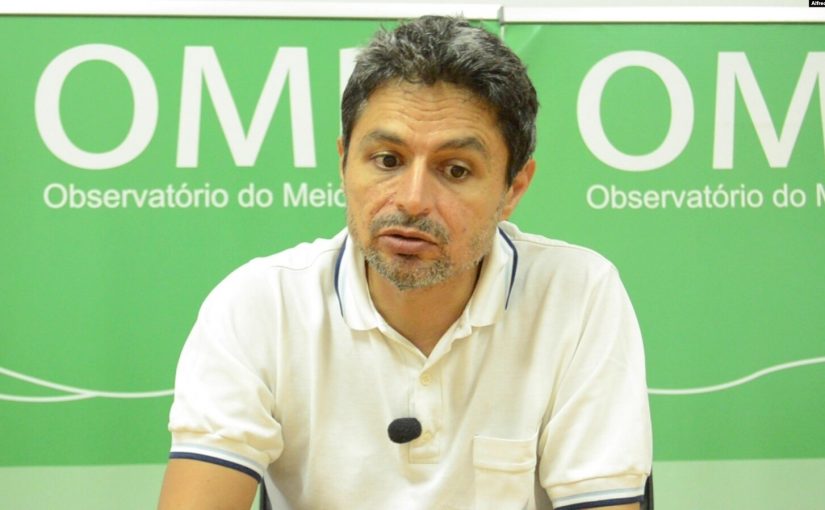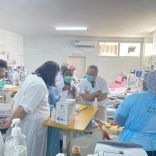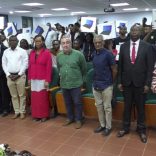Mozambique: Alice Banze named among Africa’s 100 most influential women
Cabo Delgado: Recent research warns of “movements of uncertainty”

File photo: Voa Portugues
A recent study by Joao Feijó published by Observatório do Meio Rural concludes that the return of the displaced from shelter camps for the areas of origin contrast with the arrival of newly displaced people to these same shelters, depicting an uncertain future for the population of Cabo Delgado.
This assessment by Mozambican researcher João Feijó is part of a recent study in which he questions the type of society that is intended to be created in the northern districts, when the displaced return to war-torn areas and face the same problems that prompted the emergence of the insurgency.
Thousands of displaced people are returning to the district headquarters villages ruined by the war in the north of Cabo Delgado, and which now appear to be returning to normal security conditions, while the conflict in a guerrilla format spreads to the south, causing new arrivals in resettlement centres.
“Actually, what is happening in Cabo Delgado are not exactly return movements,” João Feijó observes, noting that the “circular movements” of return to areas of origin are driven more by repulsion at the conditions in the accommodation centres than any security considerations.
The Observatório do Meio Rural (OMR) researcher emphasises that “several villages with the district headquarters are themselves now acquiring centres for displaced persons” and “we are approaching scenarios from 2018 and 2019, in which the population lived as refugees in the district headquarters villages when their own villages become insecure”.
Between 21 September and 3 October, 3,647 displaced persons left Montepuez and returned to Mocímboa da Praia, while 1,362 returned to Quissanga from Macomia.
In the same period of time, 4,709 displaced persons arrived at the displaced persons camps in Metuge, fleeing attacks in Quissanga and Chiure.
In the gas triangle
Feijó understands that more was invested in security in the triangle around the gas economy – Macomia, Mocímboa da Praia and Palma – in order to “create conditions for the French multinational Total to return to the place, because the return of the population was one of the conditions that Total had presented” as necessary for the reversal of its declaration of force majeure.
However, Feijó notes that deeper reforms are needed to create a new future, because currently “we are just pushing people into an unstable place”.
“Because the social problems that fuel the insurgency continue there, it is a fire that has not yet been completely extinguished, and that still has outbreaks. And, if people return without removing the traces that are there, the risks of things reigniting are high,” he warns.
“In fact, the population is starting to return and there is a possibility that the Government will pressure Total to reinvest. This is on the one hand good for the country, but the question that arises is what are people returning to? To 2017, to the scenario where the same problems (of price inflation, land inflation, unemployment) existed?” Feijó asks.
High risk
The sociologist also notes that the insurgency “is resorting to guerrillas”, instead of acting in the areas where it was most fortified. It is dispersing and “acting further south, in Ancuabe, Meluco, Montepuez, Chiure, and already attacking in Namuno. The risk of attacks in Balama even exists”, as the population is encouraged to return to the north.
“What is really new [in this return of the population] is doubtful,” he notes, insisting that “the work is not being done – to identify the causes of the conflict and intervene, offering the populations a new society.” “The risk of things returning to the same is high,” he insists.
Ceasefire
For Feijó, the duration of the conflict suggests that it will not be resolved by military means in the short term, which is why he proposes that “we need to start thinking about a political solution to the conflict”, which could lead to a pacification of the region and reach a new one.
Feijó understands that the political solution also involves profound reforms of the social and economic causes that led to the emergence of the conflict, “so that there will be a basis for negotiating a ceasefire” with the rebel group.
More development
Meanwhile, the government on Tuesday (08-11) approved amendments to the mining and oil laws, to allow accelerated development in provinces where sector mega-projects are operating.
“Resources are discovered and exploited in a given location, both at the district and province levels, and it is intended that the benefits will be felt in these places,” Council of Ministers spokesman Filimão Suaze explained.
Cabo Delgado is rich in natural gas, but has been dealing with attacks by armed groups linked to the Islamic State since 2017, and these have already expanded to 13 of the 17 districts of that province in northern Mozambique.
- You may read, download the full study ‘ A Return to a New Future, or a Return to the Past? – The Population Return to the Northeast of Cabo Delgado’, in English, HERE.












Leave a Reply
Be the First to Comment!
You must be logged in to post a comment.
You must be logged in to post a comment.